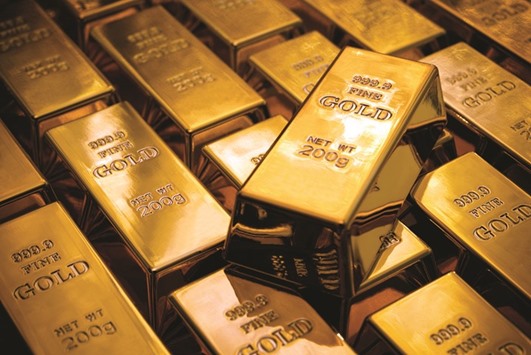The mood in the gold market is, to use the cliche, cautiously optimistic.
Prices will reach $1,385.63 an ounce by the end of the year, according to the average estimate in a survey of 16 participants at the Denver Gold Forum, the 27th annual gathering of mining executives, hedge funds, bankers and analysts that attracted more than 1,100 attendees.
The forecast is 5.1% above Tuesday’s closing futures price.
Investors piled into gold in the first half of the year as yields fell below zero on more than $8tn of government debt in developed markets. Most survey participants said the Federal Reserve’s interest-rate policy will continue to be the driving factor for the metal, which benefits as a store of value when borrowing costs are low. The other big questions on the minds of gold watchers are the US election and the stability of the global economy.
“I’ve never seen a circumstance when so many different types of people and entities are buying gold,” mining executive Randall Oliphant, the chairman of the World Gold Council, said in an interview in Colorado Springs. “Everyone is trying to figure out, what do negative interest rates mean?”
Gold had the best first half in almost four decades, rallying 25%, as the Fed held off on further rate increases and other central banks boosted stimulus to support growth.
While prices this quarter have been little changed, the metal remains attractive. Investors poured $303mn into exchange-traded funds backed by precious metals over the past week, helping keep holdings in gold-backed ETFs near a three- year high.
Bullion looks favourable over the long-term, Barrick Gold Corp President Kelvin Dushnisky said. Rob McEwen, chief executive officer of McEwen Mining, said gold may reach $1,700 to $1,900 an ounce, near a record, by the end of the year. A 25 basis-point increase in Fed rates wouldn’t change the outlook for the precious metal, said Nick Holland, the CEO of Johannesburg-based Gold Fields. “I’m very positive about gold in the long-run,” Holland said in an interview. “I think we’ll see fresh highs for gold in my lifetime. I’ll stick my neck out on that, absolutely.”
Miners aren’t the only ones citing economic and geopolitical concerns that could sustain the gold rally. Prices may reach $1,500 in coming months as central banks delay rate hikes “in fear of the unknown,” Francisco Blanch, head of commodities research at Bank of America Merrill Lynch, said in August.
A potential election to the US presidency of Donald Trump could cause “a lot of nervousness on what that means not just to the US but for the global economy,” pushing gold up to $1,400, David Wilson, a London-based analyst at Citigroup said in a telephone interview Tuesday.
State Street Global Advisors, the investment manager for SPDR Gold Shares, the largest exchange-traded fund backed by the metal, said earlier this month that the metal remains attractive to investors because interest rates in the US will remain low, even after the Fed move.
ETFs backed by the precious metal account for just 3% of the $3.21tn of assets held by investors, signalling there’s “ample room” to add strategic gold allocations to their portfolio, and supporting the gold rally, UBS Group said in a report August 16.
Not everyone is upbeat on the outlook. Georgette Boele, a currency and commodity strategist at ABN Amro Bank in Amsterdam who is one of the two most accurate gold forecasters tracked by Bloomberg in the second quarter, pared her year-end price forecast on gold.
She sees the metal at $1,325 an ounce, compared with $1,350 estimated earlier, because of the prospect of Fed rate hikes.
“We expect markets to catch up with our view of three 25 basis point Fed rate hikes by the end of 2017,” Boele said in an e-mail.
While she recognised that low yields, easy monetary policy and a longer-term downtrend in the dollar would support gold, “Fed rate hikes will be a headwind until they are priced in,” she said.

Gold had the best first half in almost four decades, rallying 25%, as the Fed held off on further rate increases and other central banks boosted stimulus to support growth.
